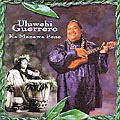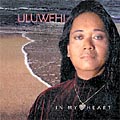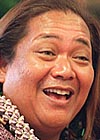By Wayne Harada
Advertiser Entertainment Editor
What a difference a year makes.
| Profile of a music man
 Real name: Rodney Benjamin Uluwehi Guerrero Real name: Rodney Benjamin Uluwehi Guerrero
 Age: 42 Age: 42
 Born and raised: On Maui Born and raised: On Maui
 Resides at: Makawao, Maui Resides at: Makawao, Maui
 High school: Maui High, Class of 1976 High school: Maui High, Class of 1976
 Little-known fact: Allergic to shellfish Little-known fact: Allergic to shellfish
 Blast from the past: Once emceed the lu‘au show at the then-Inter-Continental Hotel in Wailea (now the Outrigger Wailea), where he would nightly don fruity headgear and put on two huge balls for breasts, to sing "Princess Pupule Has Plenty Papaya." Blast from the past: Once emceed the lu‘au show at the then-Inter-Continental Hotel in Wailea (now the Outrigger Wailea), where he would nightly don fruity headgear and put on two huge balls for breasts, to sing "Princess Pupule Has Plenty Papaya."
|
A year ago, Uluwehi Guerrero was known primarily as a kumu hula, a backup singer for his friend Keali‘i Reichel, and a guy who held a full-time job as a travel desk manager for a tour company.
Then, in December 1999, the Maui-based singer, composer and kumu hula quit his job to concentrate on his music. He and Reichel put their hula school, Halau Hula O Ka Makani Wili Makaha O Kaua‘ula, on hold, causing a flurry of speculation that there was a rift between them, that Guerrero was going into competition with his more famous partner.
Guerrero, 42, toiled for months on his second CD, "In My Heart."
The CD launched a self-motivated makeover that has resulted in the loss of 120 pounds (he once topped 350 pounds). "I thought if I were going to take this musical path, I would have to do something about my life," he said.
He began making monthly treks to Japan to perform.
"It’s hard to travel when you’re large," he said. "So I figured I’ve gotta cut down."
Guerrero was known for poking fun at his size — and he still does, a bit. "I’m like one sponge," he said. "Pour a little bit of water on me, I expand. And diet is not in my vocabulary."
But the gags were merely his defense mechanism. "It’s not that I was shame of myself; I’ve always been comfortable about who I was," he said. "But I realized I was getting older and things were not going to get simpler. So I had to get started on taking care of my body."
Guerrero is known for his sweet harmonies and gentle sounds, evocative of another era. He said he owes his romantic sounds, often in the falsetto register, to his early idols — the Carpenters (specifically, Karen Carpenter) and the Kahauanu Lake Trio. Even Anne Murray.
And lyrics — particularly with tales that are personal, evoking memories of time, family and place — are important to him.
"His voice is like angels singing on Earth," said Alaka‘i, a morning drive personality on KPOA radio on Maui and a longtime buddy of Guerrero’s. "It’s so refreshing to hear something sweet and nice instead of the Island rhythm things."
 |
| His 1995 album ,“Ka Manawa Pono,” won Uluwehi Guerrero notice. |
 |
| “In My Heart” is the latest album from the now-slimmer singer. |
"Warmth of My Light" is the most-aired tune on her station. "In My Heart" has become the station’s No. 1 CD. "This sweet stuff is a welcome change," said Alaka‘i.
"Certainly, since the last album, I’ve matured," said Guerrero, referring to his freshman 1995 release, "Ka Manawa Pono," which earned him three Na Hoku Hanohano Award nominations.
His decision to focus on a singing career meant that he had to sever official relationships with the hula halau he and Reichel had faithfully led for years.
"It was a necessary evil, and no one really could see it coming, since we had planned, for the first time, to participate in Merrie Monarch this year," Reichel said in a phone conversation from Maui.
Though they no longer work together, Reichel and Guerrero are supportive of each other’s endeavors. "If he needs something, I will help; if I need, he’ll come through," said Reichel. "We’ve kept that part of our lives pat. But our lives have taken major turns over the past couple of years, and he’s on his path, and I’m on mine, and we wave to each other as we go along."
Of Guerrero’s decision to focus on music, Reichel said: "It’s important for Uluwehi to pursue the singing; he has so much talent to offer and he needs to tend to the career; I know, because I had to do that, and still am doing that now."
Ironically, Guerrero was among those who nudged Reichel into singing.
"He was one of the first influences in my life; he taught me how to sing, really," said Reichel, a kumu, chanter, composer, and Hawaiian studies scholar with roots in hula kahiko.
They had earlier worked as a lounge act at a Kapalua resort.
"And Ulu taught me how to listen to harmony, that kind of thing," said Reichel.
"You know, Keali‘i never wanted to sing. He was always hula-based," said Guerrero.
"He really boosted my confidence, and he knew singing was something I had to do to grow," Reichel said. "He created many of the early arrangements for the songs I sing, and in that respect he’ll always be a part of my career. It’s like always having his finger in my poi bowl."
At the time of their "split," there was a buzz in the hula community. "Everybody was freaking out," said Reichel. "Other teachers, other halau, some friends . . ... everyone thought there was a falling out. If those who were talking didn’t know what happened, they made up their own stories. But the split was mainly a means to move to the next level. For him and for me."
Guerrero has fond recollections of the early days, when he sang and Reichel danced.
"I think we helped bring out each other’s strengths and talent," Guerrero said.
They share a credo today: Some things work, others don’t and the important thing is to try. "That’s the measure of maturity," said Reichel. "I guess Ulu’s departure is kind of like leaving the nest."
"When his music started taking off, I was really happy for him. And when my music started making an impact, when we decided to separate, we were really two friends on this common journey," Guerrero said. "We reached the point in the road where our journeys would go separate ways, but hula always kept us bonded."
Guerrero is grateful to his fourth-grade teacher, who taught ‘ukulele and played piano. "Mr. Yabui was an inspiration in my life," said Guerrero. "I learned to play ‘ukulele by watching him and, fresh out of high school, the first thing I bought was one piano. I’m not the best piano player, but a lot of my compositions come from just sitting at the keyboards."
Guerrero is thrilled at the reception of his new CD but not particularly drawn to stardom or celebrity. "It’s not success that I’m looking for," he said. "It’s mostly a desire to take my music to a different level. I did l¬‘au shows; I did smaller gigs. But I had the opportunity to expand. When you compare the new album with the one from five years ago, the change is quite drastic. In that respect, I’m very excited.
"I’m able, through song, to tell the stories of my family and the land we love, the places we come from. Writing and perpetuating these traditions and remembrances for future generations to enjoy is kind of a responsibility we (entertainers) need to look into. A song written today is recording history for the people of tomorrow."
[back to top] |

 The Great Index to Fun
The Great Index to Fun

